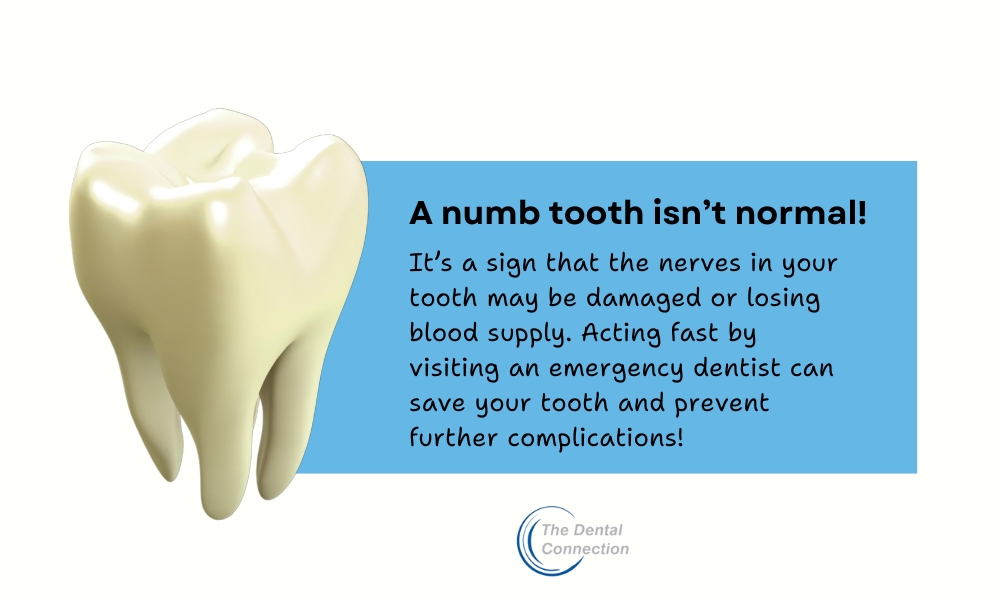General & Cosmetic Dentistry

Ever noticed your tooth feeling completely numb? It might not seem like a big deal, but it’s actually something you should never ignore.
Teeth are alive – just like your fingers or toes – with nerves and blood vessels keeping them healthy and functioning. If a tooth goes numb, it could mean it’s losing its connection to those blood vessels and is starting to die.
This isn’t just a passing issue; it’s a potential dental emergency. The quicker you act, the better chance we have to save the tooth.
Let’s talk about what might be happening and why seeing an emergency dentist in Surbiton should be your next move.
A numb tooth feels strange, almost like the sensation you get when your mouth is numbed at the dentist – but without the anaesthetic.
You might notice a lack of sensitivity to hot or cold, or even when you bite down. It’s as if the tooth has “checked out,” leaving you with an odd, disconnected feeling.
While it might not be painful, don’t be fooled – numbness is often your body’s way of signalling that something serious is happening.
It’s important to get it checked by a dentist as soon as possible to figure out what’s going on and stop the problem from getting worse.

A numb tooth can happen for several reasons, and while some may seem minor, others can be more serious. Let’s break down a few common causes:
Deep cavities can reach the inner layers of your tooth, where the nerves are located. When the damage is severe, it can cut off the blood flow to the tooth, leading to numbness
A hard knock to your mouth – whether from a fall, sports injury, or accident – can damage the nerves in your tooth. Even if it doesn’t hurt right away, numbness could be a sign of internal damage.
Advanced gum disease doesn’t just affect your gums; it can also impact the tissues supporting your teeth, including the nerves. This can sometimes lead to a numb sensation.
An untreated infection can form an abscess at the root of your tooth. As the infection grows, it can press on the nerves, causing numbness or a strange tingling feeling.
In some cases, numbness can result from damage to the nerves during dental procedures or as a complication from untreated dental issues.
Like we said already, a numb tooth might not hurt, but that doesn’t mean you should wait it out. In fact, it’s a dental emergency that needs immediate attention.
When a tooth goes numb, it often means the nerves inside are no longer getting blood flow. Without prompt treatment, the tooth could die, leading to infection, tooth loss, or even more serious complications.
Seeing an emergency dentist ensures we can identify the cause, stop further damage, and, in many cases, save your tooth. The sooner we act, the better the outcome.
So don’t ignore the signs – your tooth might not be able to wait!

When you seek an emergency dental care for a numb tooth, the treatment will depend on what’s causing the problem.
If the numbness is caused by infection or nerve damage, a root canal may be the best option. This involves removing the damaged or infected tissue, cleaning the inside of the tooth, and sealing it to prevent further issues.
For numbness caused by deep tooth decay, we’ll clean out the cavity and restore the tooth with a filling or crown. This not only stops the damage but also protects the tooth from future problems.
If gum disease is the culprit, we’ll focus on deep cleaning to remove plaque and tartar from around the tooth and gums. In severe cases, further treatment may be needed to stabilise the tooth.
And if it’s an abscess causing the numbness, we’ll drain the infection to relieve pressure on the nerve. Antibiotics may also be prescribed to clear the infection completely.
However, no matter the cause, your treatment is going to be tailored to your specific needs. The goal is to relieve the numbness and protect your oral health. But this has to be done quickly to give your tooth the best chance of recovery.
Dental emergencies can happen when you least expect them, and knowing what to look out for can make all the difference.
So, aside from a numb tooth, there are some emergencies you also need to know about. Let’s quickly show you a few of them and why they need immediate attention.

In the case of a dental emergency, acting fast can mean the difference between saving your tooth and facing more complicated treatment later.
If you’re in Surbiton and need a reliable Surbiton dentist to assess and treat your tooth, we’re here for you. At The Dental Connection, we specialise in providing high-quality care for dental emergencies like numb teeth.
Our experienced team is committed to getting to the root of the problem quickly and delivering the treatment you need in a comfortable, stress-free environment.
Don’t wait – your tooth can’t afford the delay! Call our dental practice today on 020 8786 6800 to schedule an emergency appointment, and let us help you get back to feeling your best.
Accidents happen, and sometimes braces can get damaged despite your best efforts. Whether it’s a broken wire, a loose bracket, or a missing band, it’s important to act quickly to avoid further complications.
First, stay calm and assess the situation. If a wire is poking your cheek or gums, use orthodontic wax to cover the sharp end until you can see your dentist.
For loose brackets, try to keep them in place and avoid touching them. If a band comes off, save it and bring it with you to your appointment.
Next, contact your orthodontist as soon as possible. Let them know what’s happened, and they’ll guide you on the next steps. In most cases, they’ll schedule an emergency visit to repair the damage and ensure your treatment stays on track.
Whether you’re considering getting braces or need expert help with your current treatment, The Dental Connection is here for you.
Our experienced team provides top-notch orthodontic care, from fitting braces to guiding you through every step of your journey. If you’ve got questions, concerns, or need assistance with damaged braces, we’re just a call away.
Contact us today to schedule your consultation and let’s work together to give you the confident, healthy smile you deserve!
The best way to prevent a numb tooth is by maintaining excellent oral hygiene. Brush twice a day, floss daily, and visit your dentist regularly for check-ups and cleanings.
It’s also important to treat any dental issues, like cavities or gum disease, early before they progress.
Don’t ignore it. This could be a sign of something serious, like nerve damage or infection. Call us right away so we can assess the situation and provide the necessary dental treatment. Acting quickly increases the chances of saving your tooth and avoiding further complications.
For temporary relief, rinse your mouth with warm salt water, take over-the-counter painkillers, and use a cold compress on the outside of your cheek if there’s swelling.
However, these are only temporary solutions. A toothache usually signals an underlying issue that needs professional care. Book an appointment with us as soon as possible so we can find the cause and treat it effectively.
Toothaches are the most common dental emergency we see at The Dental Connection. They’re often caused by cavities, infections, or injuries. While they may start as mild discomfort, they can quickly worsen, making it crucial to see a dentist promptly.
If a baby tooth is knocked out, don’t try to put it back into the socket as this could damage the permanent tooth growing underneath. Call us for guidance, and we’ll advise you on the next steps.
Facial or gum swelling can be a sign of an infection, abscess, or injury. Rinse your mouth gently with warm salt water, avoid applying heat, and take over-the-counter pain relief if needed.
Most importantly, contact us immediately for an emergency appointment. Swelling can sometimes indicate a serious problem that needs urgent attention.